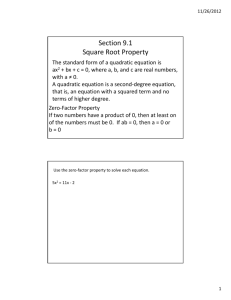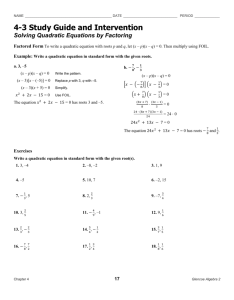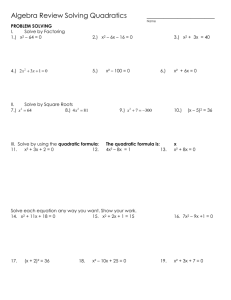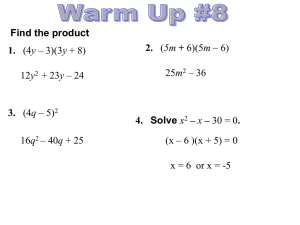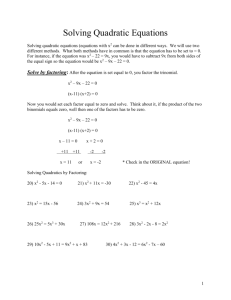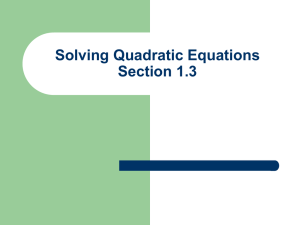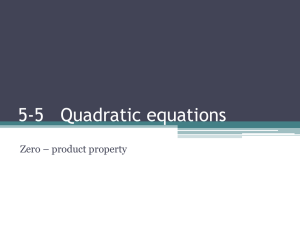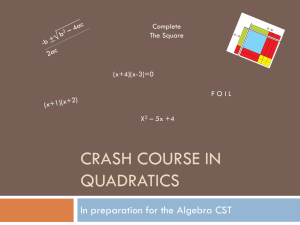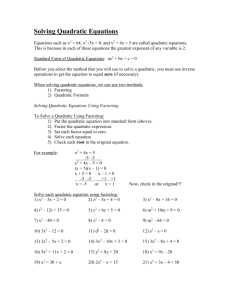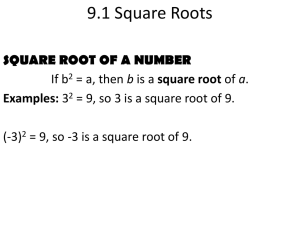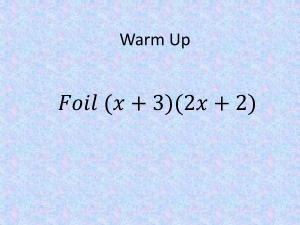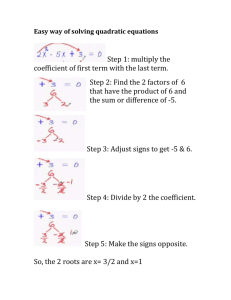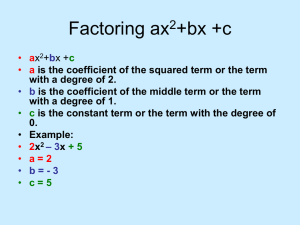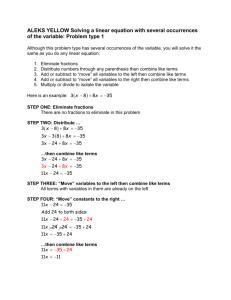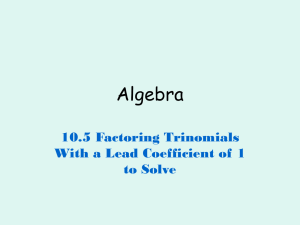Solving Quadratic Equation using Factoring
advertisement
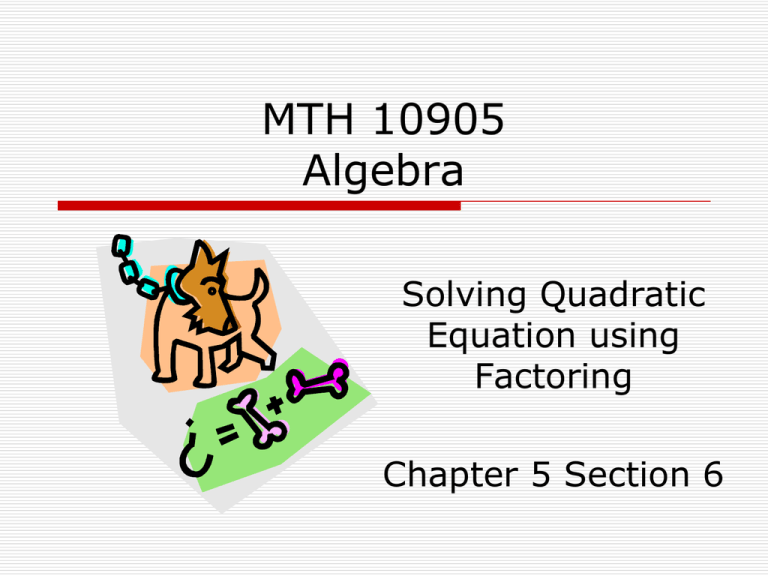
MTH 10905 Algebra Solving Quadratic Equation using Factoring Chapter 5 Section 6 Recognize Quadratic Equation Quadratic Equation in Standard Form ax2 + bx + c = 0 a, b, and c are real numbers a ≠ 0 Examples of a quadratic equation in standard form: x2 + 4x – 12 = 0 2x2 – 5x = 0 same as 2x2 – 5x + 0 = 0 3x2 – 2 = 0 same as 3x2 + 0x – 2 = 0 Zero Factor Property ab = c What do you know about a and b if their product is 6? ab = 6 a= 6 b and b= 6 a What do I know about a and b if their product is 0? ab = 0 0 a= b a=0 and b= 0 a b=0 Zero Factor Property Zero Factor Property a • b = 0, then a = 0 or b = 0 To solve a Quadratic Equation by factoring we use the Zero Factor Property. We know that is we multiply by 0 the product will be 0. If a product equals 0 then one of the factors has to be 0. Solve the Equation Example: (x + 8) (x + 2) = 0 x + 8 = 0 and x + 2 = 0 x = -8 x = -2 To write (x+8)(x+2) in standard form you must multiply using FOIL. x2 +10x +16 = 0 Does the above solutions solve the equation? YES (-8)2 +10(-8) +16 = 0 64 – 80 + 16 = 0 -16 + 16 = 0 (-2)2 +10(-2) +16 = 0 4 – 20 + 16 = 0 -16 + 16 = 0 Solve the Equation Example: (2x + 5) (3x – 7) = 0 2x + 5 = 0 and 3x – 7 = 0 2x = -5 3x = 7 5 7 x x 2 3 Check 1st solution: (2x + 5) (3x – 7) = 0 [(2)(-5/2) + 5] [(3)(-5/2) – 7] = 0 [-10/2 + 5] [-7.5 – 7] = 0 [-5 + 5] [-14.5] = 0 [0] [-14.5] = 0 0=0 Solve the Equation Example: (2x + 5) (3x – 7) = 0 2x + 5 = 0 and 3x – 7 = 0 2x = -5 3x = 7 5 7 x x 2 3 Check 2nd solution: (2x + 5) (3x – 7) = 0 [(2)(7/3) + 5] [(3)(7/3) – 7] = 0 [14/3 + 5] [21/3 – 7] = 0 [29/3] [7 – 7] = 0 [29/3] [0] = 0 0=0 Solving Quadratic Equation using Factoring 1. Write the equation in standard form with the squared term having a positive coefficient. This will result in one side of the equation being 0. 2. Factor the non-zero side. 3. Set each factor containing a variable equal to zero (0) and solve the equation. 4. Check each solution in the original equation. Solve the Equation Example: Check: 9x2 = 27x 9x2 – 27x = 0 9x(x – 3) = 0 Put in standard form GCF = 9x 9x = 0 9x/9 = 0/9 x=0 and 9x2 = 27x 9(0)2 = 27(0) 0=0 x–3=0 x-3+3 = 0+3 x=3 9x2 = 27x 9(3)2 = 27(3) 9(9) = 81 81 = 81 Solve the Equation Example: Check: x2 + 11x + 34 = 4 x2 + 11x + 30 = 0 (x + 5)(x + 6) = 0 x+5=0 and x=5–5=0–5 x = -5 x2 + 11x + 34 = 4 (-5)2 + 11(-5) + 34 = 4 25 – 55 + 34 = 4 -30 + 34 = 4 4=4 Put in standard form Factors 30 add 11 (5)(6) 6+5 x+6=0 x+6–6=0-6 x = -6 x2 + 11x + 34 = 4 (-6)2 + 11(-6) + 34 = 4 36 – 66 + 34 = 4 -30 + 34 = 4 Solve the Equation Example: 5z2 + 10z – 60 = -10z Put in standard form 5z2 + 10z +10z – 60 = 0 GCF = 5 5z2 + 20z – 60 = 0 Factors of -12 add 4 5(z2 + 4z – 12) = 0 (-2)(6) 6 + -2 5(x + 6)(x – 2) x+6=0 and x – 2 = 0 x + 6 – 6 = 0 – 6 and x – 2 + 2 = 0 + 2 x = -6 x=2 Example: -x2 + x + 6 = 0 -1(x2 – x – 6) = 0 -1(x + 2)(x – 3) = 0 x+2=0 x+2–2=0–2 x = -2 REMEMBER: Factor out -1 to make squared term positive Factors of -6 add -1 (2)(-3) 2 + -3 and and x–3=0 x–3+3=0+3 x=3 We can check by putting the solutions back into the original equation. Solve the Equation Example: Example: REMEMBER: x2 = 81 Put in standard form 2 x – 81 = 0 Difference in Two Squares a2 – b2 = (a + b) (a – b) (x)2 – (9)2 = 0 (x + 9) (x – 9) = 0 x + 9 = 0 and x – 9 = 0 x = -9 x=9 (x – 5)(x + 2) = 8 x2 + 2x – 5x – 10 = 8 x2 – 3x – 10 = 8 x2 – 3x – 10 – 8 = 0 x2 – 3x – 18 = 0 (x + 3)(x – 6) = 0 x + 3 = 0 and x – 6 = 0 x = -3 x=6 Multiply first, then put in standard form Factors of -18 add -3 (-6)(3) -6 + 3 We can check by putting the solutions back into the original equation. REMEMBER Always put the equation in standard form. ax2 + bx + c = 0 The expression that is to be factored must be equal to 0 before the zero factor property can be used. Check your answer to the original equation. HOMEWORK 5.6 Page 336: #7, 9, 11, 13, 19, 25, 37, 50
